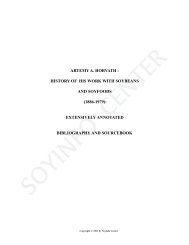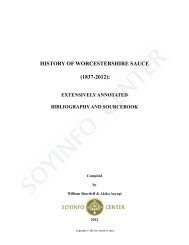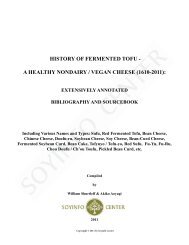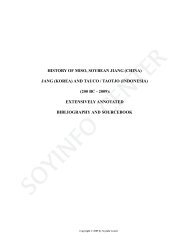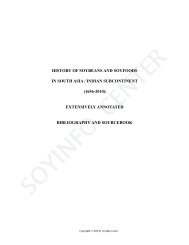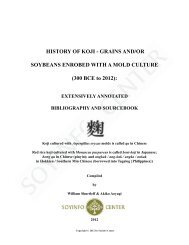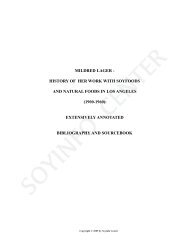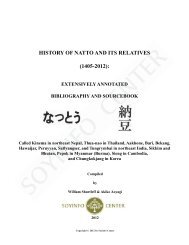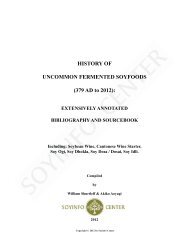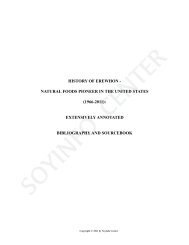history of soy yogurt, soy acidophilus milk and other ... - SoyInfo Center
history of soy yogurt, soy acidophilus milk and other ... - SoyInfo Center
history of soy yogurt, soy acidophilus milk and other ... - SoyInfo Center
Create successful ePaper yourself
Turn your PDF publications into a flip-book with our unique Google optimized e-Paper software.
Dep. <strong>of</strong> Human Ecology, Univ. <strong>of</strong> Maryl<strong>and</strong> Eastern Shore,<br />
Princess Anne, MD 21853.<br />
525. Kotzsch, Ronald E. 1984. Natural foods pioneer<br />
Erewhon (Continued–Part II). East West Journal. Feb. p. 24-<br />
29.<br />
• Summary: Continued: “In these years the company was<br />
unique not only in its activity in the marketplace but in its<br />
internal organization as well. Erewhon was basically an<br />
extended family, held together not by blood bonds but by<br />
common beliefs <strong>and</strong> aspirations. The Kushis, ‘Mom <strong>and</strong><br />
Pop,’ exercised an ultimate but benevolent authority. Day<br />
to day management <strong>and</strong> much long term policy making was<br />
in the h<strong>and</strong>s <strong>of</strong> a succession <strong>of</strong> young, idealistic ‘adopted<br />
sons,’ Hawken <strong>and</strong> Tara, followed by Roger Hillyard, Bruce<br />
MacDonald, Ty Smith, Bill Garrison, Jeff Flasher, <strong>and</strong><br />
<strong>other</strong>s. Most <strong>of</strong> the employees at all levels were macrobiotic<br />
<strong>and</strong> were committed to the Erewhon mission. Hence there<br />
was little or no gulf between managers <strong>and</strong> workers. All<br />
wore the same outfi t <strong>of</strong> jeans <strong>and</strong> vests, <strong>and</strong> went to the same<br />
lectures <strong>and</strong> parties. All ate their macrobiotic lunch provided<br />
free in the company lunchroom. People worked hard for<br />
modest wages but were recompensed by a clean, harmonious<br />
environment, <strong>and</strong> by job security. One could leave for<br />
an extended period <strong>and</strong> return assured <strong>of</strong> a position. The<br />
company took care <strong>of</strong> its own.<br />
“There were <strong>of</strong> course tensions, but they were minor<br />
<strong>and</strong> in retrospect seem almost humorous. There was the great<br />
debate, for example, over whether the retail store should<br />
carry tomatoes, potatoes, bananas, <strong>and</strong> <strong>other</strong> reasonably<br />
wholesome but not strictly macrobiotic foods. The decision<br />
in the end was ‘yes,’ the rationale being that if people wanted<br />
these foods, Erewhon should give them the best available. It<br />
couldn’t expect every customer to be macrobiotic. In general<br />
it was a heady, idyllic period.<br />
“Somewhere, somehow, though, things began to go<br />
wrong. A decision was made to move the factory <strong>and</strong><br />
warehouse to a large facility in East Cambridge <strong>and</strong> to<br />
exp<strong>and</strong> the product line <strong>and</strong> the distribution network. The<br />
transfer <strong>and</strong> expansion took much more time, energy, <strong>and</strong><br />
money than anyone expected. Large bank loans were made<br />
just when interest rates were skyrocketing. Suddenly the<br />
company found itself deeply in debt, struggling to keep<br />
up repayment schedules. Meanwhile, because <strong>of</strong> rising<br />
production costs, smaller pr<strong>of</strong>i t margins, <strong>and</strong> increased<br />
competition, revenue from sales decreased. Anxious<br />
to generate more cash, Erewhon exp<strong>and</strong>ed its product<br />
line even more, including <strong>yogurt</strong> <strong>and</strong> cheeses, vitamins<br />
<strong>and</strong> supplements. Amid an atmosphere <strong>of</strong> ideological<br />
compromise there were more loans, more interest, more<br />
pressure.<br />
“Within the company serious problems <strong>of</strong> morale <strong>and</strong><br />
loyalty were developing. At the new exp<strong>and</strong>ed facility the<br />
family model <strong>of</strong> organization ceased to pertain. Fewer <strong>and</strong><br />
HISTORY OF SOY YOGURT & CULTURED SOYMILK 207<br />
© Copyright Soyinfo <strong>Center</strong> 2012<br />
fewer <strong>of</strong> the employees were actually macrobiotic. It was<br />
growth <strong>and</strong> size that led to diffi culties among the lower<br />
echelons, the people roasting granola <strong>and</strong> loading rice on<br />
trucks. Doing dull work for a large impersonal company,<br />
even when it has a gr<strong>and</strong>, altruistic design, is still doing dull<br />
work for a large impersonal company.<br />
“There were indications <strong>of</strong> theft, waste, malingering,<br />
<strong>and</strong> abuse <strong>of</strong> privilege throughout the company. Between<br />
the managers <strong>and</strong> the workers a perceivable gap opened.<br />
Separation was followed by resentment <strong>and</strong> discontent.<br />
There was a unionization initiative, a strike, <strong>and</strong> then a<br />
movement to ‘de- unionize’ the company. In the end the<br />
union was voted out. The cost, in legal fees, was a quarter <strong>of</strong><br />
a million dollars, <strong>and</strong> in time, energy, <strong>and</strong> harmony, almost<br />
incalculable.<br />
“As a result <strong>of</strong> these various pressures the company<br />
became less <strong>and</strong> less able to pay its bills. Finally, in the fall<br />
<strong>of</strong> 1981, it fi led for bankruptcy under Chapter Eleven–a front<br />
page story in the Boston Globe. The natural foods industry’s<br />
Rock <strong>of</strong> Gibraltar had begun to slip beneath the waves.<br />
“Every failure has much to teach us. In Erewhon’s near<br />
fatal crisis one key lesson may be that ‘small is beautiful.’<br />
For an organization fueled by idealism <strong>and</strong> held together<br />
by personal commitment, growth past a certain point is<br />
a dangerous gamble. Many, perhaps most, <strong>of</strong> Erewhon’s<br />
diffi culties stemmed from the decision (perhaps never<br />
explicitly made) to exp<strong>and</strong> as much as possible. This led to<br />
a rate <strong>of</strong> growth which the company simply was not able to<br />
h<strong>and</strong>le. An organization presided over by ‘Mom <strong>and</strong> Pop’<br />
<strong>and</strong> managed by ‘inspired amateurs,’ few <strong>of</strong> whom had<br />
prior management training or experience, was not ready to<br />
cope with the pressures <strong>and</strong> decisions. Educated, shrewd<br />
pr<strong>of</strong>essionals were needed. When high-priced consultants<br />
were fi nally brought in, it was too little too late.<br />
“The disaster could perhaps have been avoided.<br />
Erewhon might have consciously rejected the intoxicant<br />
<strong>of</strong> growth <strong>and</strong> decided to remain small. It could have<br />
remained a local purveyor <strong>of</strong> macrobiotic products <strong>and</strong><br />
used its resources to establish similar fi rms or franchises<br />
in <strong>other</strong> regions. The bananas, <strong>yogurt</strong>, <strong>and</strong> vitamins might<br />
have been left to <strong>other</strong>s. Even had it not chosen to limit its<br />
size, Erewhon might have avoided serious problems with<br />
preemptive innovations. A few competent business people<br />
early on might have helped. The labor relations crisis might<br />
have been avoided by introducing job rotation, a pr<strong>of</strong>i tsharing<br />
plan, <strong>and</strong> employee stock options. Had the Kushis,<br />
who remained sole owners throughout, been more willing<br />
earlier to share that ownership <strong>and</strong> control, fi nancial partners<br />
could have been taken in. The cash fl ow <strong>and</strong> interest payment<br />
problems would have been eased.<br />
“Of course, with the cheap wisdom <strong>of</strong> hindsight, it is<br />
easy to array above the smoldering ruins the ‘what if’s’<br />
<strong>and</strong> the ‘might have been’s.’ The fact remains that as it was<br />
organized <strong>and</strong> run the company could not survive in the slack



